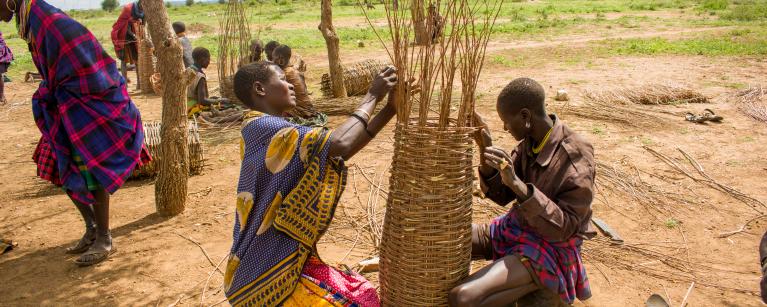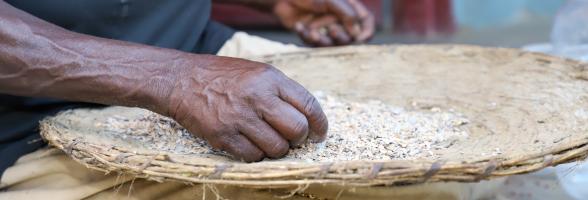CONTEXT
Uganda is endowed with natural resources, but governance of these natural resources and the effects of climate change have exacerbated poverty, disaster, and humanitarian needs.
While Uganda has made considerable progress in reducing the proportion of households experiencing poverty, 47% of households in Uganda experience multidimensional poverty, more than double the percentage of households (21%) experiencing monetary poverty (Uganda Multidimensional Poverty Profile, UBOS and UNICEF, 2020).
Karamoja sub-region, located in north-eastern Uganda, consists of Nine (9) districts of Kaabong, Kotido, Abim, Karenga, Nabilatuk, Moroto, Napak, Amudat and Nakapiripirit. While the sub-region is endowed with over 50 different minerals, including gold, copper, iron, Mable, and limestone.
It experiences the highest rate of multidimensional poverty (76%) than the national average, and more people experience monetary poverty than in the rest of the country. The poverty level is higher in Karamoja due to a multiplicity of factors, including limited employment opportunities, poor governance of mineral resources, poor agricultural yields and animal production caused by droughts and unpredictable weather due to climate change, limited access to education, and insecurity.
The most vulnerable people in Karamoja are women and youth, mainly due to the disproportionate access to productive resources such as land, cattle and income-generating opportunities. Women are disproportionately affected by food and nutrition security, given their care burden of producing and preparing food for family consumption, which partly escalates gender inequality in the region.
ABOUT THE PROJECT:
Resilience, Inclusiveness, Sustainability and Empowerment of Communities in Karamoja (RISE-K) is a project implemented by Oxfam through the Irish Aid Civil Society Partnership (ICSP) that will directly reach 37,970 women, youth and other vulnerable people from mining and pastoralist communities who are living under extreme poverty and facing severe labour rights violations. Oxfam will partner with Resource Rights Africa (RRA), the National Association of Women of Uganda (NAWOU), CARITAS Moroto, and The Uganda National Apiculture Development Organisation (TUNADO) to deliver interventions focusing on governance and accountability for effective service delivery, promotion of women’s rights, enhanced local capacity for effective people-centred, climate and conflict -sensitive, gender-responsive and inclusive disaster preparedness and response and improved income and food security.
RISE-K will be implemented under 4 broad impact areas and these include;
- People experiencing poverty and most vulnerable to shocks, conflicts and crises have more sustainable and equitable access to food and livelihoods
- People experiencing poverty and most vulnerable to shocks, conflicts and crises are better able to claim and access their rights to well-being, peace and security
- Institutional systems to prevent and respond to shocks, conflict and crises are more inclusive and better informed by the needs, rights and vulnerabilities of those furthest behind.
- People experiencing poverty, conflict and most vulnerable to shocks are better served by a nexus approach to Humanitarian Response, peacebuilding and development
PROJECT AIM:
- An empowered, inclusive, just, and resilient community in the Karamoja sub-region of Uganda
IMPLEMENTING PARTNERS:
- Resource Rights Africa (RRA)
- National Association of Women of Uganda (NAWOU),
- CARITAS Moroto
- The Uganda National Apiculture Development Organisation (TUNADO)
FUNDED BY:
- Irish Aid.
TARGET REACH:
- The marginalised and Vulnerable especially women and youth in mining and pastoralist communities
- Approximately 37,970 women, youth and other vulnerable people.
PROJECT DURATION
- (2023-2027)
BUDGET:
- €3,058,370
GEOGRAPHICAL COVERAGE:
- Moroto, Amudat and Nakapiripirit districts of the Karamoja sub-region in Uganda.

